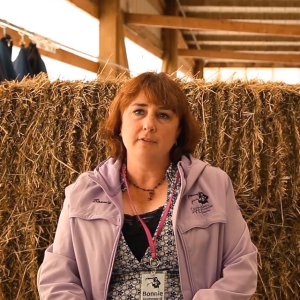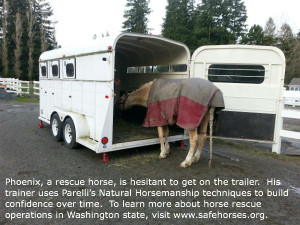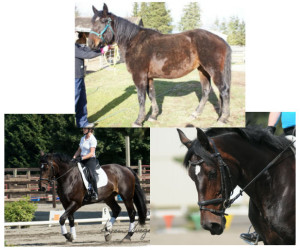 Published March 2015 by Double D Trailers’ Blog
Published March 2015 by Double D Trailers’ Blog
Bonnie Hammond is the executive director and co-founder of a very special organization called Save a Forgotten Equine (SAFE) in Woodinville, WA. SAFE’s mission is “To rescue, rehabilitate, and retrain horses facing neglect or abuse and provide them with the best opportunity for a permanent home and a lifetime of safety.” This is an extremely challenging but rewarding goal that can make a huge impact on both the lives of the horses and those caring for them. Read on to learn the top 5 reasons why you should consider adopting a rescue horse.
Keeping Horses Off of the Slaughter Trailer
SAFE started with an online group who wanted to work together to raise money and rescue a single horse from a Washington slaughter pen. After six months of successfully rescuing this one horse and several others, the group realized that they could do more for the animals by actually providing rehabilitation and retraining. SAFE was formed in November 2005. Over the years, SAFE has helped many horses in the local area. Still, they remain a small organization taking only 27 horses at a time. They operate on a shoestring budget and greatly depend on donations and volunteers.
Rehabilitate, Retrain, and Re-home Good Equine Citizens
The focus of SAFE is to not only rescue these abused, neglected and unwanted horses, but also to make sure that they are healthy and well-trained equines that can safely go to a new “forever home.” Horses that come to SAFE come from animal control seizures, or from owners who can no longer afford to care for their animals. The horses that are in the most desperate situation are sometimes taken to Northwest Equine Stewardship Center (NWESC) where they receive specialized veterinary care and observation from Dr. Hannah Mueller and her staff.
Once the horses are stable and eating normally, they will leave the center and begin the process of retraining. “In order to get horses ready to be adopted, we want to create what we call a “good equine citizen.” A good equine citizen is a horse that is safe to handle and a horse that can do the basic skills.” This means they have good ground manners and know how to behave for the farrier, vet visits, baths, fly spray, or allow themselves to be caught in the pasture. This training is extremely important.
Trailer training is a big part of that.” she continued. “If you have an emergency situation in which you need to get horses in and out of where they are, you don’t want to have to deal with a horse that refuses to load.” One of SAFE’s trainers, Terry Phelps, said, “Actually a lot of what I use to help the SAFE horses overcome their trailer fears has roots in Natural Horsemanship. Most are truly afraid of that big box and it takes patience and a willingness to work through it at their pace for it to succeed.”
The horses also receive under saddle training and are worked to the point that they can easily handle walk, trot, and canter under saddle. This includes exposure to trail riding. From here, they are ready to undergo more specialized training including disciplines like jumping or even dressage. Regular updates and videos on each horse’s training progress are available on their website for potential adopters to view in advance.
Two Success Stories: Owen the Untouchable Stallion and Delilah the Dressage Champion
Bonnie shared her personal account of two special horses at the SAFE rescue center. One is Owen, an Curly Horse stallion who was going to be put down by his owner because she had lost her property. “He was six years old and he was untouchable. He didn’t wear a halter and he didn’t want to let anyone near him.” Bonnie feels strongly that “not providing training for a horse really ought to be considered a form of abuse as well. Horses are too big and too dangerous to grown into full sized animals to not know how to walk on a lead line or put a halter on.”
Over the last six months, Owen has blossomed under SAFE’s care. “He is an amazing horse! He is one of the smartest horses I’ve ever met. He has this way of reasoning out problems and thinking through things that are scary.” Once he was gelded, he was started on his ground and under saddle training. “He’s going to make someone an absolute treasure!”
A second special story is about a draft-cross named Delilah. She was an animal control seizure who was starved and nine months pregnant when she came to SAFE. After delivering a healthy colt, she was retrained and sold to a lady who is now showing her in 1st Level Dressage where she qualified for the Regional Championships! “To see her out there in the ring among horses that are a lot more expensive, a lot better bred, a lot more carefully brought up, and to see her competing at that level was really amazing.” Bonnie stressed that a big part of their work at SAFE is retraining these horses. “It’s not enough to just save their lives and get them new homes. People want horses that they can do stuff with.”
The Ups and Downs of a Horse Rescue
For Bonnie, her favorite part of working with rescue horses is seeing them “come back to life.” She shared, “We take in horses that are in the most desperate conditions. They’ve been starved. They been neglected and abused. Watching them regain their physical beauty…we get to see the light come back on in their lives…their whole demeanor changes. They start to relax. They start to get that spark and they start to get that glow again. That is hands down the best part of rescuing horses.” She said that horses are animals that don’t forget when they are abused but they are willing to give people another chance and they have a sense for when you are trying to help them. “It inspires me to no end.”
There are many challenges that go along with this operation as well. Bonnie said she is frustrated by the never-ending need for rescue services. “The biggest challenge is that the need never seems to slow down or go away. There are always horses out there that are in bad conditions…It’s a struggle not to let that continual need get me down.” She also cautioned against the over breeding of horses, saying, “Foals are amazing. They’re beyond adorable, but they grow up in to 1200 lb animals that need a lot of care and a lot of space. We end up with so many horses that are unwanted due to backyard breeding.” She said it’s important to have a plan for that foal’s entire life.
As you can imagine, the SAFE operation needs a great deal of equipment to operate their farm and transport their animals. They currently use a three horse trailer to transport their animals, although “one of our wish list items would be to have a trailer that is a little taller inside. Our biggest horses, when put into our current trailer…their ears touch the ceiling.” Also on their wish list, they would love to have a SAFE-owned truck to haul the trailer as well as a custom horse trailer that could be used to haul their two mascot mini-horses to promotional events like parades and school events.
Top 5 Reasons to Adopt from Horse Rescue
That leaves us with the top 5 reasons to adopt a rescue horse:
- Horse rescues really know their horses. If you were to rescue a horse from a slaughter pen, you would have no idea the horses training and natural temperament. It’s much better to rescue a horse from an organization like SAFE where they’ve taken the time to rehabilitate and retrain the animal under saddle and in hand. They know the animal really well and can help you find a really good fit. Videos, photos, and training updates are available on the SAFE website and they are going to be very honest about the horse’s vices so that they can make a good match for horse and rider. Bonnie’s #1 tip is to make sure you take the time to really get to know your potential rescue horse beforehand since these resources are available.
- Free up the space for another horse to be rescued. Bonnie explained, “Adopting a horse with us means that we have the opportunity to help another horse in need.”
- It’s your chance to give back. It is truly a wonderful thing to give back to a horse who has been abused. “We exist to make up for the fact that other humans have mistreated this horse. By rescuing them, it’s our chance to say we’re sorry on behalf of the people who don’t do right by horses,” said Bonnie.
- Not just an inexpensive option. Although rescue horses may be less expensive than other horses for sale, Bonnie cautioned, “The people who make the best adopters are not the people who are looking for a diamond in the rough or looking for an inexpensive option.” Don’t take a rescue horse purely because of selfish or money-saving reasons. Make sure you also want to help this animal to succeed. Bonnie stated, “The very best adopters aren’t thinking ‘what can this horse do for me,’ but ‘what can I do for this horse.’”
- Rescue horses can go on to do great things! Just look at the story of Delilah who became a successful dressage horse. These horses have the potential to be wonderful and talented companions. They may come to the rescue underfed and run down, but that doesn’t mean that they don’t have loving hearts and intelligent minds.
Rescue horses can be wonderful companions for many different types of people. Take an active role in your local horse rescue, and you can ensure that these animals have a second chance at life. By adopting one of these animals, you can free up the space for another desperate animal to be brought in for help. We encourage you to find your local rescue operation and get involved to make a difference. For more information about SAFE rescue in Washington state, visit their website at www.safehorses.org.





What you had to say about trailer training your horse was really interesting. I agree that training them to get over their fear of trailers would be important in emergency situations. I’ve always wanted to adopt a rescue horse, and I would also try to get a comfortable trailer for him in case he needed to be transported.